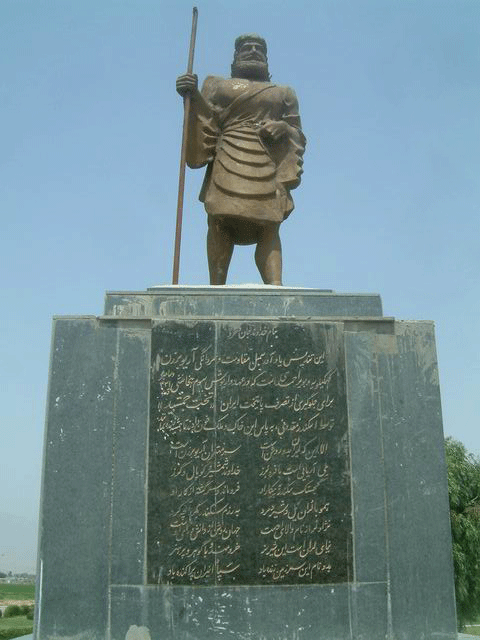Ariobarzan (آریو برزن) (around 368 BC-330 BC) was a Persian satrap of Persis and military commander. He is best known for commanding the Persian army at the Battle of the Persian Gate northeast of today's Yasuj against Alexander of Macedonia in the winter of 330 BC. As a result today Iranians can look back, stand proud and declare that their country has been greatly recognized as the homeland of courage, altruism and selflessness of many brave patriots who stood firmly against invaders and defended their beloved homeland and whose achievements will never be forgotten.
Ariobarzan was made satrap of the southern province of Fars in present-day Iran in 335 BC by Darius III Codomannus. The Persian Empire suffered a series of defeats against the Macedonian forces at Issus and Gaugamela, and by the end of 331 BC Alexander had advanced to Babylon and Susa. A Royal Road connected Susa with the more eastern capitals of Persepolis and Pasargadae in Persis, and was the natural venue for Alexander's continued campaign. Following the Persian defeat at Gaugamela, Darius realized he could not defend his capital Persepolis and traveled east to rebuild his armies at Ecbatana, leaving Ariobarzan in command. Meanwhile Alexander split his army and led his 14,000 strong force towards the Persian capital via the Persian Gates. Ariobarzan was charged with preventing the Macedonian advance into Persis, and to this effect he relied heavily on the terrain Alexander needed to pass through; a narrow mountain pass that lent itself easily to ambush. There were only a few possible routes through the Zagros Mountains, all of which were made more hazardous by winter's onset. The valley preceding the Persian Gate, called the Tang'e Meyran, is initially very wide, allowing the Macedonian army to enter the mountains at full march. Ariobarzan occupied a position near the modern-day village of Cheshmeh Chenar. The Persian Gate was only a couple of meters wide at the point of ambush with visibility limited due to the rising sun. Once the Macedonian army had advanced sufficiently into the narrow pass, the Persian troops of just over 1,000 rained down boulders on them from the northern slopes. From the southern slope, Persian archers and catapults launched their projectiles.
Alexander's army initially suffered heavy casualties, losing entire platoons at a time. The Macedonians attempted to withdraw, but the terrain and their still-advancing rear guard made an orderly retreat impossible. Alexander was forced to leave his dead behind to save the rest of his army. The Persian success at the Battle of the Persian Gate was short lived though although it gave the Persians hope that it would provide Darius more time to field another army and possibly stop the Macedonian invasion altogether.
After being held off for 30 days, Alexander succeeded in encircling the Persian army in a pincer attack with Philotas and broke through the Persian defenses. Some sources indicate that the Persians were betrayed by a captured tribal chief who showed the Macedonians an alternate path that allowed them to outflank Ariobarzan while a token force remained in the Macedonian camp under the command of Craterus. Alexander and his elite contingent then attacked the force of Ariobarzan from above in a surprise attack until the Persians could no longer block the pass.
Although precise figures are unavailable, historians generally agree that this engagement cost Alexander his greatest losses during his campaign to conquer Persia. According to some accounts, Ariobarzan, and his surviving companions were trapped, but rather than surrender, they charged straight into the Macedonian lines. One account states that Ariobarzan was killed in the last charge while another version reports that Ariobarzan escaped to the north where he finally surrendered to Alexander with his companions. The defeat of Ariobarzan's forces at the Persian Gate removed the last military obstacle between Alexander and Persepolis. Upon his arrival at the city of Persepolis, Alexander seized the treasury of Persepolis, Alexander allowed the troops to loot Persepolis, kill all its men and enslave all its women. In 330 BC, Alexander ordered the terrace of Persepolis, including its palaces and royal audience halls, to be burned before leaving to find Darius III.
كنون گويمت رويدادي دگر / زتاريخ ديرين اين بوم و بر
چو اسكندر آمد به ملك كيان / يكي گرد فرمانده ي قهرمان
به ايرانيان داد درس وطن / دراين ره گذ شت از سرو جان و تن
كه فرزند نام آور ميهن است / مرآن شير دل آريو برزن است
چو نزديك شد لحظه ي واپسين / به ميدان_ آورد گفت اين چنين
بدان اي سكندر پس از مرگ من/ پس از ريزش آخرين برگ تن
تواني گشايي در پارس را / نهي بر سرت افسر پارس را
به تخت جم و كاخ شاهنشهان / قدم چون نهي بادگر همرهان
مبادا شدي غره از خويشتن / كه ايران بسي پرورد همچو من
چو اسكندر اين جانفشاني بديد / سرانگشت حيرت به دندان گزيد
به آهستگي گفت با خويشتن / كه اينست مفهوم عشق وطن
اگر چند آن آريا مرد گرد / پي پاس ايران زمين ، جان سپرد
ولي داد درسي به ايرانيان / كه در راه ايران چه سهل است جان





.jpg)


Nice one ...
ReplyDelete